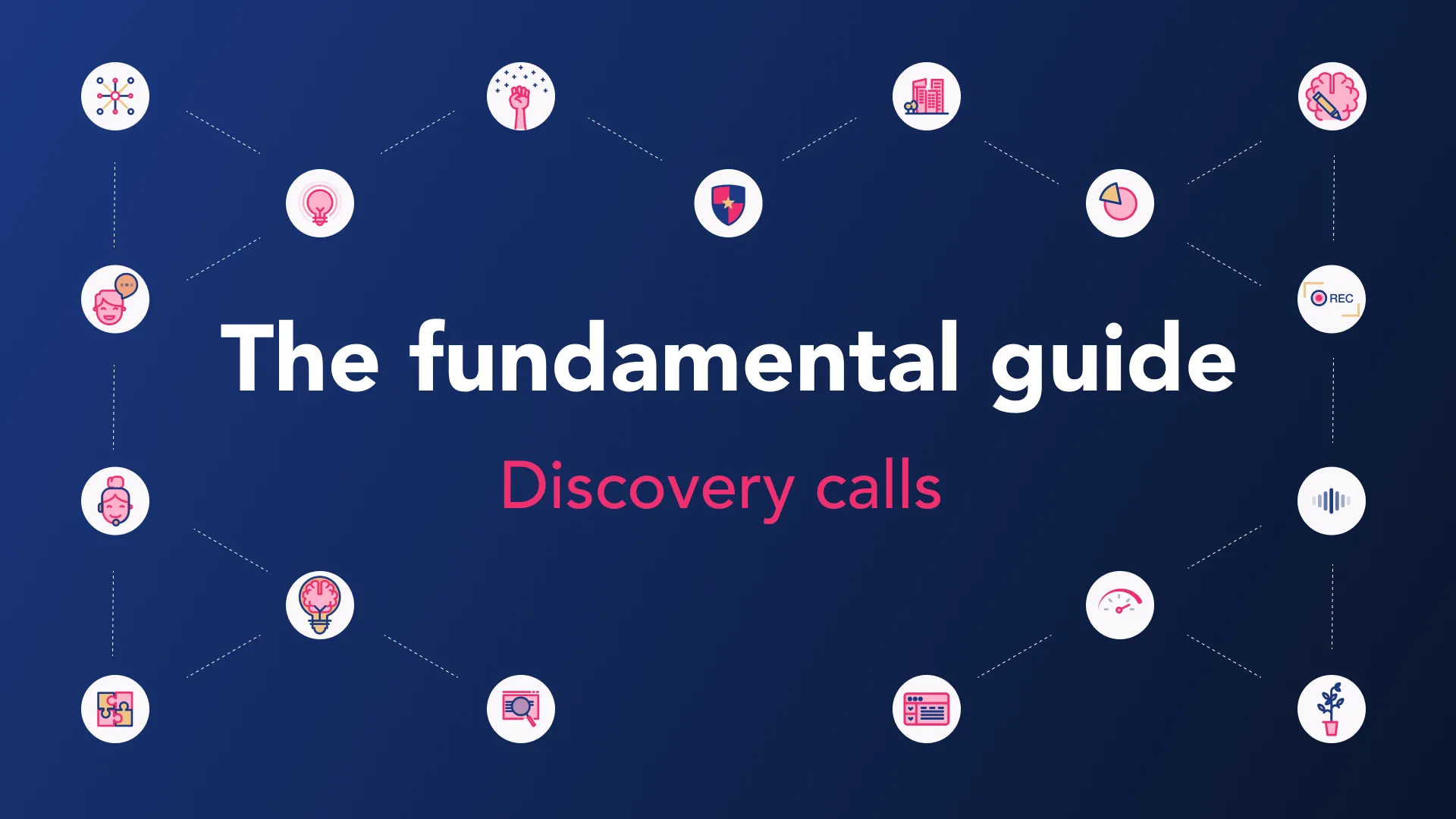Effective sales discovery questions enable a rep to determine if their product or service is a good solution for the specific prospect - a key step in some of the most effective sales methodologies. That's why nailing your discovery process and having a great bank of discovery questions, unique to your business, is crucial.
What is a sales discovery call?
The sales discovery call is the first formal meeting with a prospect in the sales process. This call is a valuable opportunity for a sales rep to get to know the potential customer and understand the buyer’s needs, challenges, priorities, and goals.
Why is the sales discovery call so important?
Since reps only have one chance to start the sales process with each potential client and make a positive impression, it's essential that they get their discovery call right to lock in a successful outcome.
It takes an average of 8 touches to get an initial meeting with a new prospect (and that call may be the rep’s one and only chance to speak with that potential new customer). This is mostly because prospects do a lot of research online and narrow their solution options before speaking to a salesperson.
How to prepare for an effective discovery call
Although prospects may share attributes, industries, needs, or challenges, each one brings unique characteristics as well. So, it’s important for reps to do their homework in advance of discovery calls to ensure their success.
Past history prep
Before researching prospects, reps should check the company CRM. It’s essential to determine if anyone in your company has ever engaged with this potential customer previously and what the outcome was. Plus, this may provide additional valuable insights.
Research, research, research
Gather information about your prospect, their company and their industry. With the vast amount of information available online, this investigation shouldn’t take more than five to fifteen minutes per prospect.
Get to know the person
It’s helpful to know some personal and professional facts about a prospect before speaking with them. Having this knowledge enables reps to prepare questions that help build rapport and start the conversation off on a positive note. Look for locations, previous employers, schools, or interests in common. This can help launch the conversation by bringing up identified commonalities.
Company and context
When seeking insights about a prospect’s company, start by looking at the company website and social media pages. Then search for recent news articles about the company. Information about the prospect’s business that reps should be focusing on include:
- Product or service offering
- Their standing in the marketplace
- Annual sales
- If they’ve had, or are anticipating, a merger or acquisition
- If there are any apparent pain points that your solution would solve
It’s also a good idea to find the company’s competitors and what your company’s relationships are with them. It’s helpful to know if any of these competitors are currently using your solution.
Go industry-wide
Being current with industry data is always a good idea. If the prospect’s industry is one that isn’t encountered on a routine basis, it might be time to do a quick refresher on what is happening in their sector. Doing a Google search should reveal any key trends or changes occurring in the industry and help guide the line of discovery questions. It’s also beneficial to know which industry the prospect is in because you may already have clients in the industry, providing deeper insights around how the prospect may benefit from your solution.
Pre-qualify
Only 50% of prospects are a good fit for your solution. It’s best to learn this before investing valuable sales time on a call with a lead that is unlikely to become a paying customer - or worse, become a troublesome one. So, taking the time to review the facts uncovered during pre-call research can be a real time-saver. It decreases the number of discovery calls while increasing productivity and close rates. And it’s a result of spending more time with highly qualified prospects. Disqualifying a prospect at this point is just as important as qualifying. By disqualifying a lead, you free up more time to spend with potential buyers who are more likely to become paying customers, which ultimately increases overall close rates while increasing productivity.
Identify the gaps
Gathering all this prospect information enables reps to prepare to build rapport and trust. Plus knowing which department and position the lead is in helps identify common needs and challenges ahead of the call. It also makes it possible to have a better conversation with the potential customer instead of interrogating them. This previous knowledge allows reps to share what they know and ask deeper discovery call questions from the start to fill in the gaps instead of starting from scratch, which frustrates prospects, potentially alienating them.
Post-call prep
An effective discovery call is only the beginning of the sales process. So, why not keep up the momentum by preparing a follow-up content package to be shared with the prospect immediately following the call? Having a selection of relevant blog posts, eBooks, videos, or reports ready makes it easier to send them off without hesitation. This puts valuable insights from your company at the fingertips of your prospect for easy reference as they work through their buying process.
How to run a discovery call
Running a successful discovery call is all about preparation, active listening, and thoughtful questioning. Your goal is to uncover the prospect’s needs, challenges, and decision-making process, while building trust and rapport. Here’s how to structure your discovery call to ensure it’s both informative and engaging:
Set the agenda early
Start by laying out the framework for the call. This lets the prospect know what to expect and ensures that both parties are aligned on the purpose of the conversation. A simple opener like, “I’d love to learn more about your business goals and challenges to see how we can help—does that sound good to you?” is enough to establish rapport and set a clear direction.
Ask open-ended questions
Discovery calls are about uncovering pain points, so the questions you ask should encourage the prospect to open up. Focus on open-ended discovery questions for sales, such as “What are the biggest challenges you're facing in reaching your goals?” or “Can you tell me more about how your team is currently addressing this issue?” These questions will lead to detailed responses, giving you the insight needed to offer relevant solutions.
Listen actively
Active listening is one of the most important elements of a discovery call. Pay close attention to not just what the prospect says, but how they say it - so the prospect feels like they are receiving relevant insights. Take notes on the prospect's goals, key pain points and any specific terminology they use. This will help you frame your solution in a way that resonates with their priorities and concerns.
Identify pain points and needs
A successful discovery hinges on accurately identifying the prospect's pain points. Ask targeted questions like, “What’s currently blocking you from achieving your business goals?” or “What impact are these challenges having on your team?” By doing so, you uncover areas where your product can provide value, and this information becomes crucial for tailoring your pitch.
Gauge fit and budget
Throughout the conversation, it’s important to assess whether there’s a genuine need for your product or service and if the prospect has the budget to invest in it. Questions about their current solutions, budget constraints, and timeline help you determine whether you’re speaking to a qualified opportunity. If they have the right fit but lack budget, you might explore different pricing models or adjust expectations for future discussions.
Summarize key takeaways and next steps
Before ending the call, summarize the key points discussed to ensure you’ve captured the most critical information. This demonstrates that you’ve been listening carefully and gives the prospect a chance to clarify anything. Finally, schedule the next step, whether it’s a demo, follow-up meeting, or internal discussion.
By following this structured approach, you ensure that your discovery call not only gathers the information you need but also builds a strong foundation for a productive sales relationship.
Questions to ask in a discovery call
There’s lots of information you ideally want to get out of the prospect during the discovery call to set yourself up for a successful sales process. So ask the prospect:
What are the goals of your business and of your specific department?
Understanding the overarching goals of your prospect's business and their department provides a clear view of where your product or service can add value. This discovery call question allows you to align your solution with their priorities, making the conversation about them and not just about your offering. Tailoring your sales strategy to address their unique business goals is crucial for a successful discovery process.
By getting specific about their department's objectives, you're able to uncover key pain points and position your offering as a direct path to achieving those goals. This also helps build rapport, showing that you're not just selling but also invested in their success.
What current blockers are you experiencing around these goals?
A successful discovery call hinges on uncovering your prospect's pain points. Asking about current blockers brings to light the challenges that might prevent them from reaching their business goals. These are the pain points your solution can address, so it’s crucial to dig into what is standing in the way of progress.
By addressing these roadblocks early, you're framing your product as a necessary tool for overcoming obstacles. Moreover, understanding blockers helps fine-tune your sales strategy, ensuring that your pitch speaks directly to the prospect's immediate needs, increasing the chances of moving the deal forward.
Where do you sit within the organization and what metrics are you responsible for?
This question is essential to gauge how influential your prospect is in the decision-making process. Understanding their role and the metrics they're accountable for will help you tailor your message to their specific needs and the company’s broader goals. A successful discovery should uncover what key performance indicators (KPIs) matter most to your prospect.
By connecting your solution to the metrics they are responsible for, you're not just solving a problem; you're enhancing their performance and their standing within the organization. This knowledge also helps in crafting a targeted follow-up that speaks directly to their responsibilities.
What budget have you allocated for this project/problem/solution?
Addressing budget concerns early on in a discovery call saves both you and the prospect time. This question reveals whether they have the financial means to invest in your product or service. If they don’t, your next steps could involve exploring alternative solutions or payment structures that might still align with their needs.
Understanding the budget also helps in determining the scope of your proposal. Without discussing budget, you run the risk of presenting a solution that is either over or under-scoped, which can derail an otherwise successful discovery process.
What other products or services do you currently use? And what is your tech stack?
Understanding the prospect’s current tech stack or services is crucial for positioning your product as complementary or superior. This discovery question helps you identify whether your solution integrates well with their existing systems or if there are any gaps you can fill.
By discovering what tools they already use, you also get an opportunity to assess how familiar they are with solutions like yours and how much education may be needed. This insight can also reveal competitive dynamics, allowing you to position your offering more effectively.
Who else in the organization would be involved in the decision-making process and who give the ultimate go-ahead?
This is one of the most important discovery questions for sales. Identifying the decision-makers early helps prevent wasted efforts on prospects who lack purchasing power. It’s important to understand not only who influences the decision but also who holds the final say.
Knowing this allows you to tailor your approach to address the concerns of each stakeholder, ensuring you’re covering all your bases. Successful discovery calls focus on aligning with the entire decision-making unit to move deals forward smoothly.
What timeline are you working towards to purchase a solution?
Uncovering the prospect's timeline is essential for prioritizing your pipeline. A successful discovery call not only identifies pain points but also establishes urgency. If your prospect is ready to buy soon, your follow-up process will look different than if they are months away from making a decision.
This discovery question helps you manage expectations on both sides, adjust your sales strategy accordingly and manage your sales pipeline. It also allows you to pace your efforts, ensuring you're staying aligned with their schedule and making your product top of mind when they’re ready to make a move.
When are you available to book in the next step in the sales process?
This question serves as a natural conclusion to a successful discovery call. If the prospect qualifies, scheduling the next steps solidifies their commitment and keeps the momentum going - avoiding a dreaded ghosting. By getting a firm commitment for the next meeting, you demonstrate the value of moving forward and maintain control of the sales process.
This question also reinforces that discovery calls are part of a broader sales strategy, one that continuously drives the conversation toward a close.
Discovery call template
The most effective sales people start with a discovery call script like this, then adapt it to suit the prospect’s unique needs and communication style. Use this as a starting point to create your own approach, personalizing as you go.
Rep:
Hi [Prospect’s Name], this is [Your Name] from [Your Company]. I noticed that you’ve [shown interest in X or were referred by Y], and I’m excited to connect with you today.
I saw [something relevant about their company or industry—e.g., you just launched a new product, or look to be hiring at scale]. Could you tell me a little more about that?
For today’s conversation, I’d love to discuss [briefly outline the agenda, e.g., your current goals, challenges, and how we might be able to help]. Does that sound good to you? And is there anything specific you’d like to add to our discussion?
Prospect:
[Answers]
Rep:
Great! To kick things off, can you tell me a little about your role? What are your top priorities for this year, and what goals are you trying to achieve?
I’ve spoken to many professionals in [prospect’s role] within [industry], and I frequently hear that [specific challenge, e.g., scaling efficiently or improving lead conversion] is a common issue. Are you facing something similar? If so, how is it affecting your team or operations day to day?
Prospect:
[Shares their challenges]
Rep:
That makes sense. What steps have you taken so far to address that challenge? How has that been working for you?
Based on what you’re trying to achieve, what are the key benefits you’d like to see from a new solution? And how would that impact your overall goals?
Prospect:
[Responds]
Rep:
Got it! Just to clarify, what’s your current setup, and what metrics do you use to measure success? How well is that system meeting your expectations? Are there specific gaps you’ve identified that a new solution would need to address?
[At this point, share insights about your product and how it can address their challenges. For example: “We’ve helped companies like yours solve X by offering Y. Our customers typically see improvements in Z area within the first few months.”]
In terms of cost, achieving [the outcomes you mentioned] typically falls between [provide a price range]. How does that compare with what you were expecting?
Prospect:
[Answers]
Rep:
Thanks for sharing! Could you walk me through your purchasing process? Who else at your company would be involved in the decision, and what are their main concerns or priorities when evaluating new solutions?
I’d love to show you exactly how our platform can help with [specific challenges]. Would it make sense to schedule a demo for next week? We could include [suggest other stakeholders] to ensure everyone is on the same page.
Prospect:
[Agrees or suggests a different time]
Rep:
Perfect! I’ll send over the invite for [time and date]. In the meantime, if you have any questions, feel free to reach out. Looking forward to diving deeper into how we can help your team achieve [desired outcome].
How to make your discovery calls memorable
Demonstrate understanding
Buyers want to speak with sales reps who take the time to do their homework. Prospects expect sellers to demonstrate a strong understanding of their company, industry, common challenges and how your solution improves their day-to-day. They don’t want to spend their time educating salespeople on things they should already know. By showing potential customers you already understand them, it puts you in their good graces and sets a positive tone for future engagements.
Being armed with a clear understanding, complete with essential details, enables the creation of a tailor-made solution designed to best meet the customer’s requirements. It also makes it easier for the rep to serve up quality content and insights to better guide the prospect through their buying journey (which is another thing that buyers prefer!)
Don’t be “just another rep”
There are key characteristics buyers find desirable. Listening, for example, has been shown to be so appealing to buyers that sales reps who make the effort to listen intently have the ability to influence them. Other ways reps can differentiate themselves from their competitors during a discovery call is by uncovering the full set of buyer needs, communicating value, and showing buyers what’s possible.
Personalize the conversation
Personalization is no longer a “nice to have” - it’s a must for making your discovery calls memorable. Tailor your questions and responses based on what you know about the prospect’s role, challenges, and industry. Prospects can tell when they’re being treated like just another name on a list, and they’ll appreciate the effort you put into making the conversation relevant to them. By personalizing the call, you’ll foster a deeper connection, showing that you’re genuinely invested in helping them succeed, not just closing a deal.
Focus on value, not features
While it’s tempting to dive into the features of your product during a discovery call, focusing on the value it delivers will make a more lasting impression. Prospects don’t care about every feature—they care about how your product can solve their pain points and make their work easier. Frame your conversation around the outcomes they’ll achieve by using your solution, and back up your claims with real-world examples or success stories that resonate with their situation. This approach helps keep the focus on the prospect and their goals, rather than on your product alone.
Make questions thought-provoking
Asking questions that challenge your prospect to think differently about their current situation can leave a lasting impact. Rather than sticking to generic discovery call questions, aim to ask thought-provoking ones that uncover deeper insights into their challenges. For example, “What happens if you don’t solve this problem in the next six months?” or “How do you see your industry changing in the next few years, and how will that impact your business?” By getting them to think critically, you position yourself as a trusted advisor, not just a salesperson.
Be a guide, not a seller
After the call, follow up with materials that reinforce the conversation and add additional value. This could be a relevant case study, an industry report, or a custom solution proposal that directly addresses their pain points. A personalized, thoughtful follow-up demonstrates that you listened closely and are genuinely interested in solving their challenges. It keeps you top of mind and strengthens the relationship, making your discovery call stand out even after the conversation has ended.
The game-changer: Recording & coaching discovery calls
It’s impossible for sales leaders to listen to each discovery call in the moment, nor would you want to. There are too many elements to observe, so discussing the call, even immediately after it’s completed, would be confusing at best. That’s why it’s essential to record all discovery calls.
This facilitates reviewing all of these calls, even ones that take place concurrently. It makes it possible to gather data, insights, and analytics to guide deeper analysis of each call while saving time.
Recording discovery calls isn’t only a timesaver that makes it possible to review all calls when most convenient. These recordings also simplify sales coaching by allowing easy identification and assessment of specific moments based on what a rep is working on improving. They also facilitate self-coaching and peer-to-peer coaching, taking the pressure off the sales leader—spreading the burden of coaching across the entire team and accelerating results.
Elements to review include:
- Did the rep do their homework? This will be evident if the rep is prepared to build rapport and asks questions based on pre-call research. This also allows them to meet prospects where they are in their buying process.
- Are the rep ask open-ended questions to uncover challenges, budget, authority, timeline, and to determine if the prospect is a good match?
- Are they practicing active listening? This can be determined by checking the talk-to-listening ratio data on the call. If they are doing this, they are asking clarifying questions to gain deeper insights around the lead’s situation, goals, and concerns. Then they confirm their understanding by paraphrasing what they heard.
- Assess overall results as well with standardized KPIs such as percent of highly qualified leads converted to the next sales meeting and percent of pipeline closed/won.
Call recordings also make it possible for team members to review and learn from their own calls. They can identify poorly worded questions or unpleasant word crutches they may be using when there should be silence or a more smoothly spoken sentence. The ability to replay portions of their own calls simplifies tracking their progress as well while working on improving specific elements of the discovery call.
Unlock insights with Jiminny
Ready to start reviewing your discovery calls? Flick through our sales call scoring guide.
Tom Lavery is the CEO and Co-Founder of Jiminny, the leading conversation intelligence and sales coaching platform that helps companies maximize their revenue. With over 15 years of experience in high-growth VC/PE-backed SaaS companies, Tom was previously SVP at Reward Gateway, now sharing his wealth of knowledge as a speaker in the conversation intelligence space.





.webp)






